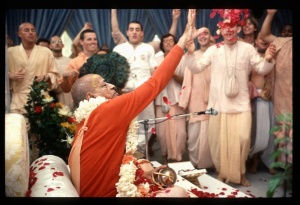CC Madhya 16.218 (1975): Difference between revisions
(Vanibot #0027: CCMirror - Mirror CC's 1996 edition to form a basis for 1975) |
(Vanibot #0020: VersionCompareLinker - added a link to the Version Compare feature) |
||
| Line 2: | Line 2: | ||
<div style="float:left">'''[[Sri Caitanya-caritamrta (1975)|Śrī Caitanya-caritāmṛta (1975)]] - [[CC Madhya (1975)|Madhya-līlā]] - [[CC Madhya 16 (1975)|Chapter 16: The Lord's Attempt to Go to Vṛndāvana]]'''</div> | <div style="float:left">'''[[Sri Caitanya-caritamrta (1975)|Śrī Caitanya-caritāmṛta (1975)]] - [[CC Madhya (1975)|Madhya-līlā]] - [[CC Madhya 16 (1975)|Chapter 16: The Lord's Attempt to Go to Vṛndāvana]]'''</div> | ||
<div style="float:right">[[File:Go-previous.png|link=CC Madhya 16.217 (1975)|Madhya-līlā 16.217]] '''[[CC Madhya 16.217 (1975)|Madhya-līlā 16.217]] - [[CC Madhya 16.219 (1975)|Madhya-līlā 16.219]]''' [[File:Go-next.png|link=CC Madhya 16.219 (1975)|Madhya-līlā 16.219]]</div> | <div style="float:right">[[File:Go-previous.png|link=CC Madhya 16.217 (1975)|Madhya-līlā 16.217]] '''[[CC Madhya 16.217 (1975)|Madhya-līlā 16.217]] - [[CC Madhya 16.219 (1975)|Madhya-līlā 16.219]]''' [[File:Go-next.png|link=CC Madhya 16.219 (1975)|Madhya-līlā 16.219]]</div> | ||
{{CompareVersions|CC|Madhya 16.218|CC 1975|CC 1996}} | |||
{{RandomImage}} | {{RandomImage}} | ||
==== TEXT 218 ==== | ==== TEXT 218 ==== | ||
<div class="verse"> | <div class="verse"> | ||
:mahaiśvarya-yukta | :mahaiśvarya-yukta duṅhe--vadānya, brahmaṇya | ||
:sadācārī, satkulīna, dhārmikāgra-gaṇya | :sadācārī, satkulīna, dhārmikāgra-gaṇya | ||
</div> | </div> | ||
| Line 18: | Line 17: | ||
<div class="synonyms"> | <div class="synonyms"> | ||
mahā-aiśvarya-yukta—very opulent in riches; duṅhe—both the brothers; vadānya—very magnanimous; brahmaṇya—devoted to brahminical culture; sat-ācārī—well behaved; sat-kulīna—aristocratic; dhārmika-agra-gaṇya—on the top of the list of religious persons. | mahā-aiśvarya-yukta—very opulent in riches; duṅhe—both the brothers; vadānya—very magnanimous; brahmaṇya—devoted to brahminical culture; sat-ācārī—well-behaved; sat-kulīna—aristocratic; dhārmika-agra-gaṇya—on the top of the list of religious persons. | ||
</div> | </div> | ||
| Line 25: | Line 24: | ||
<div class="translation"> | <div class="translation"> | ||
Both Hiraṇya Majumadāra and Govardhana Majumadāra were very opulent and magnanimous. They were well behaved and devoted to brahminical culture. They belonged to an aristocratic family, and among religionists they were predominant. | Both Hiraṇya Majumadāra and Govardhana Majumadāra were very opulent and magnanimous. They were well-behaved and devoted to brahminical culture. They belonged to an aristocratic family, and among religionists they were predominant. | ||
</div> | </div> | ||
Latest revision as of 09:54, 27 January 2020

His Divine Grace
A.C. Bhaktivedanta Swami Prabhupada
A.C. Bhaktivedanta Swami Prabhupada
TEXT 218
- mahaiśvarya-yukta duṅhe--vadānya, brahmaṇya
- sadācārī, satkulīna, dhārmikāgra-gaṇya
SYNONYMS
mahā-aiśvarya-yukta—very opulent in riches; duṅhe—both the brothers; vadānya—very magnanimous; brahmaṇya—devoted to brahminical culture; sat-ācārī—well-behaved; sat-kulīna—aristocratic; dhārmika-agra-gaṇya—on the top of the list of religious persons.
TRANSLATION
Both Hiraṇya Majumadāra and Govardhana Majumadāra were very opulent and magnanimous. They were well-behaved and devoted to brahminical culture. They belonged to an aristocratic family, and among religionists they were predominant.